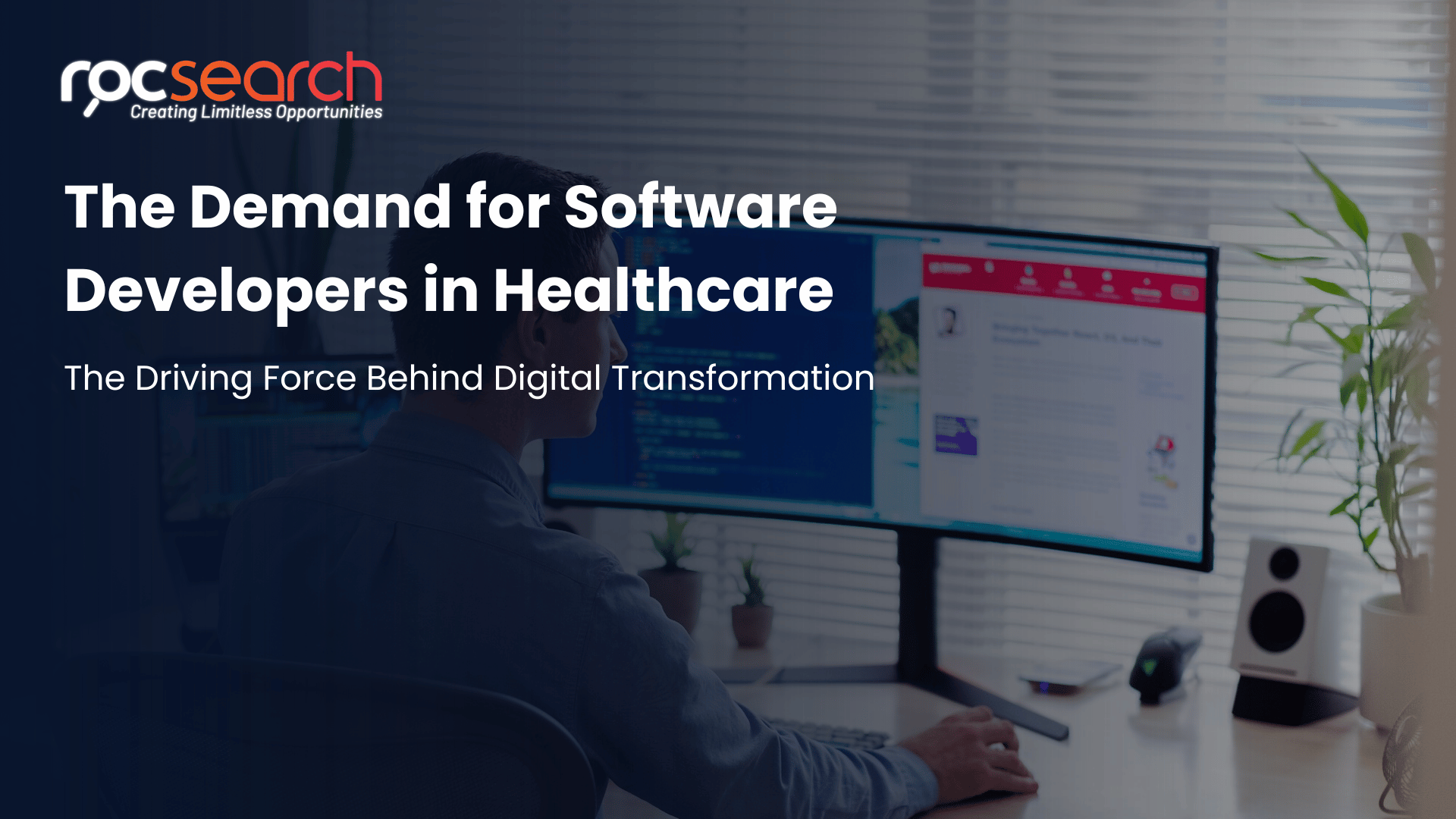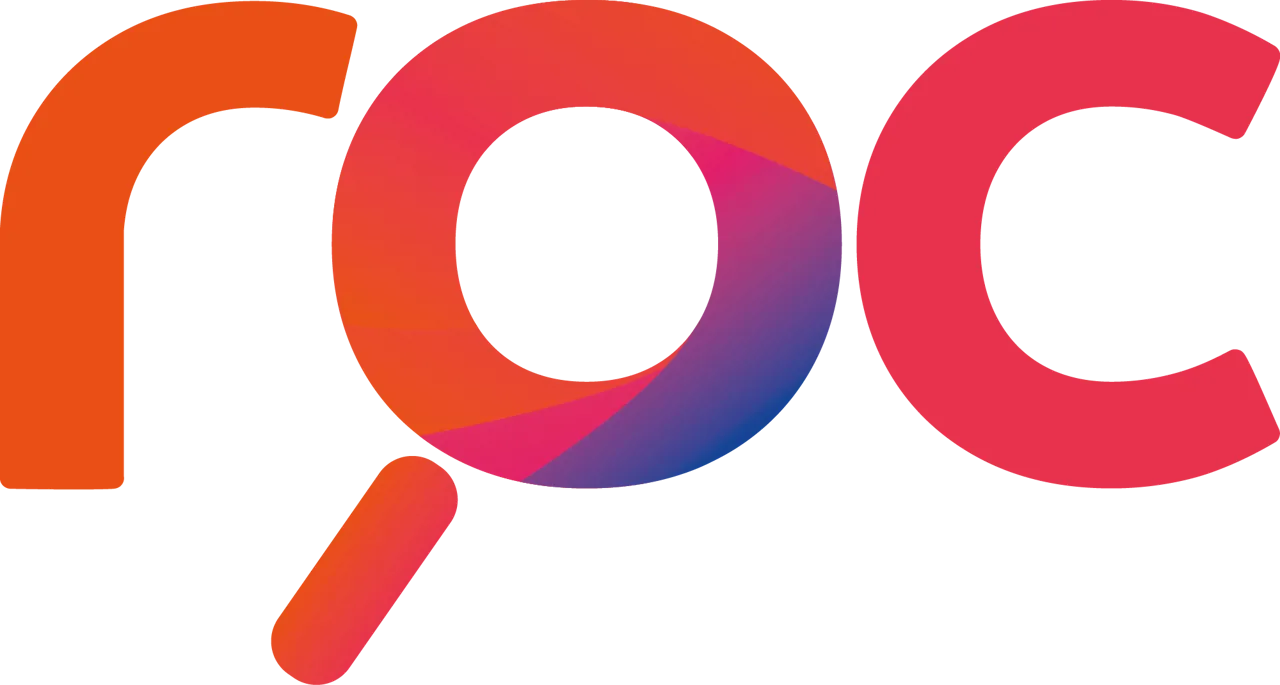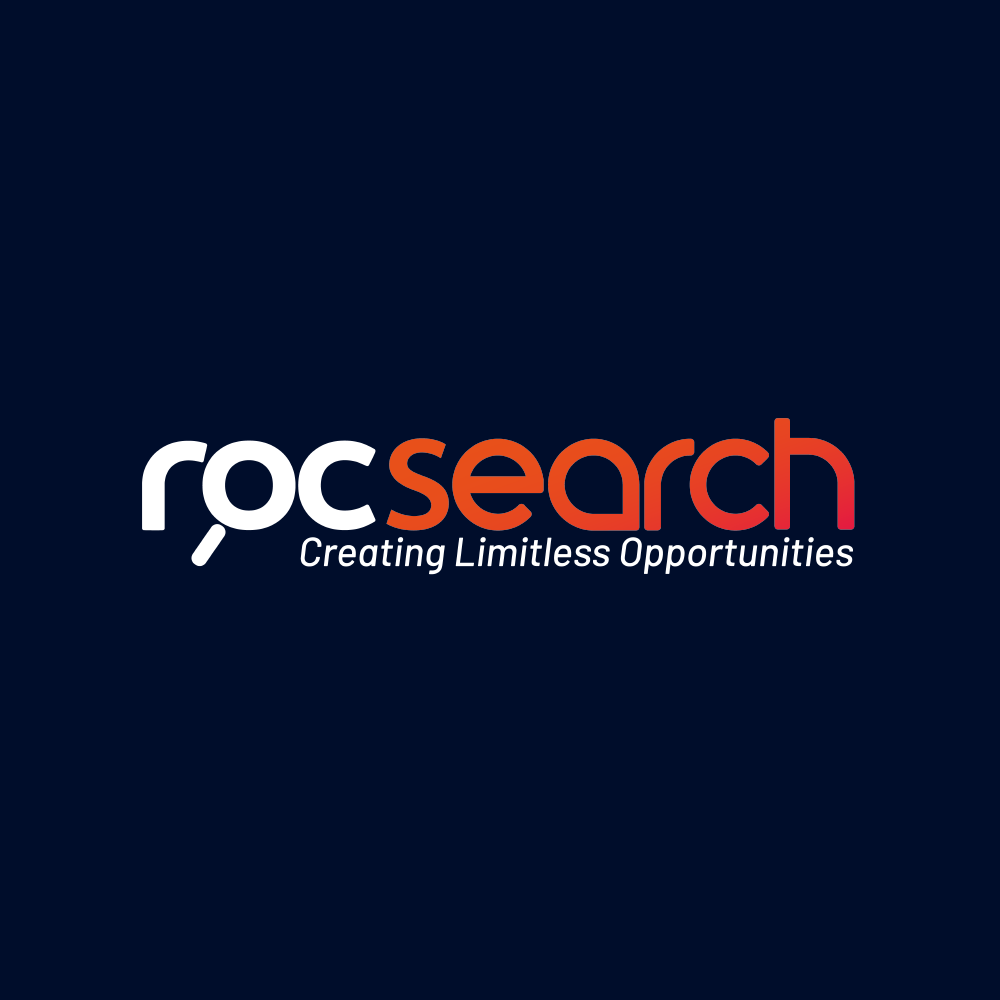
The Demand for Software Developers in Healthcare
15 Jul, 202410 minutesIn recent years, the healthcare industry has undergone a remarkable digital makeover driven ...

In recent years, the healthcare industry has undergone a remarkable digital makeover driven by technology advancements. With a growing focus on patient well-being and streamlining operations, software developers are at the forefront, reshaping healthcare delivery and management through innovative solutions.
In this guide, we will explore the driving force behind the digital transformation of the healthcare industry and how it is leading to increased demand for software developers. We will also touch on the role of healthcare software developers, the essential skills required, and potential career opportunities.
First, let’s dive into the driving factors behind digital transformation within the healthcare industry:
The Driving Force Behind Digital Transformation
The shift towards digital transformation in healthcare is not a simple upgrade of existing systems. It aims to improve all aspects of healthcare delivery through technical solutions, from patient care to administrative processes.
Curious about the key factors that are driving this transformation? Take a look below:
1. Introduction of Electronic Health Records (EHSs)
EHR systems are central to the digital transformation of healthcare. By streamlining storage and retrieval, these systems empower healthcare providers to deliver timely treatments. With EHRs, patient records are no longer scattered across different departments and facilities. Instead, they are consolidated into a single, accessible digital format.
Benefits of EHRs
Here are the key benefits of EHRs in improving patient care:
- Centralised patient information allows for better coordination among healthcare providers.
- Consolidated records help reduce errors and improve patient safety.
- Streamlined processes eliminate the need for traditional paperwork and tests.
- An overview of patient histories leads to more accurate diagnoses.
- Facilitates better communication between different healthcare providers.
- EHRs help to maintain compliance with healthcare regulations and standards.
2. The Rise of Telemedicine
Next, let’s examine the impact of telemedicine on the digital transformation of healthcare. Now, patients can consult with doctors remotely and receive care without leaving their homes. Telemedicine platforms make it easy to have video consultations, remote monitoring, and virtual follow-ups. They bring healthcare to people in remote or underserved areas, making access to care more accessible than ever.
The telemedicine market size is expected to increase from USD 94.44 billion in 2023 to USD 286.22 billion by 2030. With such a huge growth rate, there is no doubt that as the telemedicine market expands, the demand for software developers will grow.
Benefits of Telemedicine
What are the specific benefits of telemedicine for patients and healthcare professionals?
- Provides healthcare access to patients in remote or underserved areas.
- Patients can consult with doctors without leaving their homes.
- Minimises the risk of infection transmission, particularly during pandemics.
- Reduces travel and associated costs for patients and providers.
- Enables ongoing monitoring and follow-up care for chronic conditions.
- Increases patient satisfaction by providing timely and convenient care options.
3. Advanced-Data Analytics in Medical Research
Data analytics, boosted by machine learning and AI tools, is revolutionising medical research. Researchers can now find patterns and insights that were once impossible to see. For patient care, this is good news. Early disease detection, personalised treatment plans based on genetic data, and smarter population health management are all possible with this technology.
Benefits of Advanced Data Analytics
Let’s take a closer look at the benefits of advanced data analytics in patient care and delivery:
- Early detection of diseases through predictive modelling.
- Customised treatment plans based on individual data.
- Improved population health management through data-driven insights.
- Streamlines research processes and accelerates discoveries.
- Reduces expenses linked with trial and error in treatment plans.
- Empowers healthcare providers to make informed, evidence-based decisions.
4. Patient-Centric Care Models
While it’s true that modern healthcare is increasingly focused on patient-centric care, developers play a crucial role in this shift. Creating innovative patient portals and mobile apps empowers individuals to manage their health information easily.
These tools allow patients to engage more actively in their healthcare journey, providing access to medical records, appointment scheduling, and direct communication with healthcare providers.
Benefits of Patient-Centric Care Models
To break it down, here are the key benefits of patient-centric care models:
- Empowers patients to take control of their health information.
- Easy access to medical records, appointment schedules, and communication channels.
- Increases patient engagement in their healthcare journey.
- Helps patients adhere to treatment plans with reminders and tracking tools.
- Provides personalised health education and resources.
- Enhances patient satisfaction by making healthcare more accessible and personalised

Career Opportunities for Software Developers in Healthcare
Unsurprisingly, the rise of digital transformation in healthcare means an ever-growing demand for software developers. Developers are one of the most essential parts of healthcare delivery. Why? They are the driving force behind all things technology. Their skills and expertise allow technical solutions, from telemedicine to EHRs, to advance future patient care and delivery.
According to research, the employment rate for software engineers is expected to grow 25% from 2021 to 2031. This figure provides a clear idea of the growing demand for software developers across all industries, largely influenced by the shift towards digital solutions.
You might be wondering, what is the specific role of software developers in healthcare? Here, we offer some insight into the different career opportunities, as well as the roles and responsibilities involved in healthcare software developer jobs:
1. Medical Software Engineer
The primary role of a medical software engineer is to develop and maintain software systems. From applications such as electronic health records to medical imaging, software engineers ensure these systems are reliable and secure and drive effective patient delivery.
Roles and responsibilities of a Medical Software Engineer
Let’s take a closer look at the roles and responsibilities of a medical software engineer:
- Designing healthcare applications such as EHRs and medical imaging systems.
- Work collaboratively with doctors and nurses to understand their needs to produce innovative software products.
- Follow strict regulations like HIPAA to protect patient data privacy and security in software applications.
- Use advanced technologies, such as blockchain, to develop advanced functionalities, such as predictive analytics for disease prevention.
- Assist with the implementation of software systems across different healthcare facilities, such as providing technical support and troubleshooting.
Why Is It a Good Opportunity?
So, why is a medical software engineer a good career opportunity for software developers?
- Innovation - Developers have the opportunity to work with ground-breaking technology to contribute to the future of innovative healthcare delivery. Your ideas have the potential to shape the future of how patients receive their care.
- High Demand - As the healthcare industry adopts new digital technologies, the demand for new software engineers is rising. With this demand spanning across various industries, developers have plenty of opportunities for career growth, such as in telemedicine.
- Impactful Work - In the healthcare industry, your work can make a big difference in patient delivery. From enhancing access to patient data to collaborating with researchers, you have the opportunity to contribute to more accurate diagnosis and streamlined patient care.
2. Healthcare App Developer
Healthcare app developers act as the architects behind the tools that bring healthcare directly to your fingertips. Whether it's patient monitoring apps or medication management systems, they design solutions that empower both patients and healthcare providers. Healthcare apps aren't just practical. They’re secure, user-friendly, and meet stringent healthcare standards.
Roles and Responsibilities of a Healthcare App Developer
Here are the primary roles and responsibilities of a healthcare app developer:
- Design and develop mobile web applications, such as telemedicine platforms, patient monitoring apps, and medication monitoring systems.
- Implement innovative features and technologies like real-time data synchronisation, AI-driven diagnostics, and personalised health tracking.
- Conduct testing to ensure app reliability and performance across several different devices.
- Provide technical support and troubleshooting for app users.
- Stay educated on emerging trends in mobile health technologies to improve app capabilities and enhance user experience.
- Ensure applications are compliant with healthcare standards and regulations such as HIPAA.
Why Is It a Good Opportunity?
Below are the main reasons why a healthcare app developer is a good opportunity:
- User Engagement - As a healthcare app developer, you help patients take control of their help through mobile applications. Communication is improved between patients and providers, where you can have a direct impact on streamlining healthcare management.
- Market Demand - There is no doubt a high demand for skilled developers in the mobile health sector. As apps for telemedicine and patient monitoring are being introduced, developers are able to gain a strong career outlook.
- Global Advancement - Healthcare app developers have the ability to create solutions that can be used worldwide. Through working with the latest technologies, such as AI, machine learning, and blockchain, you can contribute to making healthcare more accessible globally.
3. Clinical Systems Analyst
Clinical systems analysts act as the problem-solvers within healthcare IT. Evaluating and improving clinical IT systems is a crucial part of the role. By optimising system performance and efficiency, they become huge contributors to enhancing patient care and delivery.
Roles and Responsibilities of a Clinical Systems Analyst
Typical roles and responsibilities involved in the role of a clinical systems analyst are as follows:
- Assess current clinical information systems to ensure they align with healthcare provider needs and integrate smoothly into clinical workflows.
- Ensure seamless integration of clinical systems with other healthcare IT systems to streamline operations and improve data sharing.
- Continuously monitor and enhance the performance of clinical systems to ensure they run smoothly and effectively.
- Identify, analyse, and resolve issues within clinical systems promptly to minimise disruptions and maintain smooth operations.
- Develop and implement system improvements and updates to enhance functionality and user experience.
- Provide training to healthcare professionals to ensure they can effectively utilise clinical information systems.
Why Is It a Good Opportunity?
Take a look below at why pursuing a career as a clinical systems analyst is a good choice for career development:
- Optimisation - As a clinical systems analyst, you have the opportunity to improve healthcare efficiency by fine-tuning workflows and enhancing how hospitals and clinics operate. Not only does this make things run smoother, but it also directly benefits patients by ensuring they receive better care.
- Collaboration - You'll work closely with healthcare professionals, like doctors and nurses, to understand their needs and implement tech solutions. Collaboration with various teams is highly valuable in expanding your skill sets and career growth.
- Various Areas of Specialisation - With so many avenues to specialise in, like healthcare informatics and telehealth, you can mould a career path that aligns perfectly with your interests and strengths, contributing to the future of healthcare technology in meaningful ways.
4. AI/ML Engineer
AI/ML engineers specialise in developing artificial intelligence and machine learning models to analyse vast healthcare datasets. AI technology has proved to be invaluable in contributing to personalised treatment plans and more accurate diagnoses.
Roles and Responsibilities of an AI/ML Engineer
So, what are the roles and responsibilities of an AI/ML engineer?
- Develop and deploy machine learning models to analyse healthcare data to produce predictive analytics.
- Work with healthcare professionals to grasp their needs and develop AI/ML solutions to streamline patient care and delivery.
- Collecting, cleaning, and preprocessing data from various sources.
- Evaluating model performance using various metrics and validation techniques.
- Deploying machine learning models into production environments.
- Monitoring model performance and accuracy in production.
- Staying knowledgeable with the latest advancements in AI and machine learning.
Why Is It a Good Opportunity?
Embarking on a career as an AI/ML engineer is a great opportunity for the following reasons:
- In-demand skill set - According to a recent survey by Morgan Stanley Research, 94% of healthcare companies reported using AI/ML in various aspects of their operations. Evidently, AI and machine learning skills are highly sought after in the healthcare industry. As an AI/ML engineer, you'll be in a position to meet this demand and contribute significantly to the digital transformation of industries.
- Transferable Skills - The skills you gain as an AI/ML engineer are incredibly versatile and open doors to a variety of career paths. From healthcare to finance and beyond, industries are eager for experts who can solve complex problems with data-driven solutions. You can continuously learn, grow professionally, and make a significant impact.
- Contribution to Ground-Breaking Projects - In healthcare, AI and machine learning drive innovations from diagnosing diseases to predicting outcomes and improving treatments. As an AI/ML engineer, you'll lead groundbreaking projects that can transform healthcare, making it more efficient while saving lives along the way.
In-Demand Skills of a Software Developer in Healthcare
Now that we have uncovered the potential different career opportunities for healthcare software developer jobs, it is important to explore the overall necessary skills needed to thrive in this area of work.
So, what are the key technical skills required from a software developer in healthcare?
- Proficiency in HL7, FHIR, and other interoperability standards.
- Ability to implement strong security measures to protect patient data.
- Experience in data mining, visualisation, and predictive analytics.
- Skills in creating secure and user-friendly mobile applications.
- Knowledge of cloud platforms like AWS, Azure, and Google Cloud.
- Understanding of designing intuitive interfaces for healthcare professionals and patients.
- Awareness of healthcare regulations such as HIPAA and GDPR.
- Expertise in integrating diverse healthcare systems and applications.
- Ability to develop algorithms for medical research and predictive modelling.
- Experience in agile software development practices for iterative improvement.
Some of the key soft skills involved in healthcare software developer jobs are:
- Ability to explain technical information to non-technical audiences.
- Strong analytical skills to identify issues and develop innovative solutions.
- Flexibility to quickly learn new technologies and adapt to evolving healthcare environments and standards.
- Can work well with various teams, including other developers, clinicians, and administrative staff.
- Able to manage several projects at the same time, prioritising tasks to deliver high-quality work on time.
- Leading projects, mentoring junior developers, and guiding teams towards achieving common goals.
- Skills to manage and resolve conflicts within teams or with stakeholders, ensuring smooth project progress.
To learn more about the different industries offering the biggest opportunities for software developers, discover our insightful guide - 5 Industries With The Biggest Opportunity for Software Developers.
Key Takeaways on the Demand for Healthcare Software Developers
From the introduction of Electronic Health Records (EHRs) and the rise of telemedicine to the integration of advanced data analytics and patient-centric care models, technology is changing how patient care is delivered and managed. Software developers are pivotal in this digital transformation, driving innovation across all facets of healthcare.
As the demand for digital health technology continues to soar, so does the need for skilled software developers. Careers in healthcare software development offer abundant opportunities for professionals looking to make a meaningful impact. Whether as medical software engineers designing secure and efficient EHR systems, healthcare app developers creating user-friendly interfaces for telemedicine platforms, or AI/ML engineers leveraging data analytics to personalise treatment plans, developers play a crucial role in driving the future of healthcare delivery.
Searching For Healthcare Software Developer Jobs?
If you’re looking to embark on a career in software development, our technical recruitment agency is here to help. Our consultants are experts in their field. With deep industry knowledge, extensive networks, and valuable resources, we excel at placing top candidates into global organisations.
To learn how our technical recruitment agency can help you achieve your professional ambitions, contact one of our consultants today.




